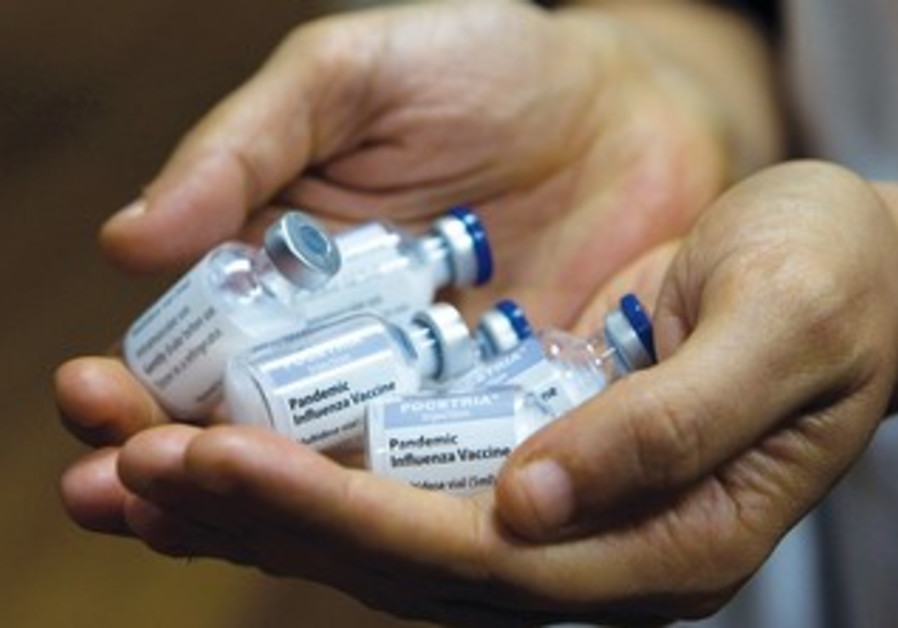80 child cancer patients exposed to measles at Petah Tikva hospital
Tel Hashomer Infectious Diseases Prevention Unit immunology researcher Aylana Reiss-Mandel said that it is precisely because of vaccines’ success that some people don’t recognize their importance.
1 minute read.

A three-year-old boy with measles exposed an estimated 80
children from all over Israel to the disease at Schneider Children’s
Medical Center in Petah Tikva.
Infectious Diseases Unit director Yitzhak Levy said they ask parents if their children had received regular vaccines and the father of this child had said that he did.
“You have to ask his dad, I don’t know why [he didn’t get vaccinated] but the fact is, he didn’t,” Levy said. “Dad says it’s for technical reasons – ask him.”
Had the hospital staff known the child had not been vaccinated, they would have quarantined him and not have let him walk around, he said.
The child was treated in the hemato-oncology ward, due to a blood disease, where cancer patients – whose immune systems are already compromised – are also treated.
“He got the regular treatment, and went through various stations in the hospital,” the hospital’s assistant to the spokesperson Linor Nevo-Albo said. “Some days afterward, we got a report that the same child was indeed sick with measles, and therefore we checked all the children who were perhaps with him, in the same environment.”
All the children who were exposed to the measles received a vaccine and none of them currently have the disease, Levy said, because there is a vaccine that works over 99% of the time.
“We call on all children to get vaccinated,” he said.
Tel Hashomer Infectious Diseases Prevention Unit immunology researcher Aylana Reiss-Mandel said that it is precisely because of vaccines’ success that some people don’t recognize their importance.
“Today we really don’t see the diseases that we’re talking about vaccinating, and thank God that we don’t, so it’s hard to understand the importance and how far we’ve come because of vaccines,” she said.
“Even with herd immunity, there’s always a very, very small risk of contracting something... with somebody who hasn’t been immunized.”
Infectious Diseases Unit director Yitzhak Levy said they ask parents if their children had received regular vaccines and the father of this child had said that he did.
“You have to ask his dad, I don’t know why [he didn’t get vaccinated] but the fact is, he didn’t,” Levy said. “Dad says it’s for technical reasons – ask him.”
Had the hospital staff known the child had not been vaccinated, they would have quarantined him and not have let him walk around, he said.
The child was treated in the hemato-oncology ward, due to a blood disease, where cancer patients – whose immune systems are already compromised – are also treated.
“He got the regular treatment, and went through various stations in the hospital,” the hospital’s assistant to the spokesperson Linor Nevo-Albo said. “Some days afterward, we got a report that the same child was indeed sick with measles, and therefore we checked all the children who were perhaps with him, in the same environment.”
All the children who were exposed to the measles received a vaccine and none of them currently have the disease, Levy said, because there is a vaccine that works over 99% of the time.
“We call on all children to get vaccinated,” he said.
Tel Hashomer Infectious Diseases Prevention Unit immunology researcher Aylana Reiss-Mandel said that it is precisely because of vaccines’ success that some people don’t recognize their importance.
“Today we really don’t see the diseases that we’re talking about vaccinating, and thank God that we don’t, so it’s hard to understand the importance and how far we’ve come because of vaccines,” she said.
“Even with herd immunity, there’s always a very, very small risk of contracting something... with somebody who hasn’t been immunized.”